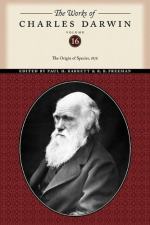Finally, the several classes of facts which have been considered in this chapter, seem to me to proclaim so plainly, that the innumerable species, genera, and families of organic beings, with which this world is peopled, have all descended, each within its own class or group, from common parents, and have all been modified in the course of descent, that I should without hesitation adopt this view, even if it were unsupported by other facts or arguments.
CHAPTER 14. RECAPITULATION AND CONCLUSION.
Recapitulation of the difficulties on the theory of
Natural Selection.
Recapitulation of the general and special circumstances
in its favour.
Causes of the general belief in the immutability of
species.
How far the theory of natural selection may be extended.
Effects of its adoption on the study of Natural history.
Concluding remarks.
As this whole volume is one long argument, it may be convenient to the reader to have the leading facts and inferences briefly recapitulated.
That many and grave objections may be advanced against the theory of descent with modification through natural selection, I do not deny. I have endeavoured to give to them their full force. Nothing at first can appear more difficult to believe than that the more complex organs and instincts should have been perfected, not by means superior to, though analogous with, human reason, but by the accumulation of innumerable slight variations, each good for the individual possessor. Nevertheless, this difficulty, though appearing to our imagination insuperably great, cannot be considered real if we admit the following propositions, namely,—that gradations in the perfection of any organ or instinct, which we may consider, either do now exist or could have existed, each good of its kind,—that all organs and instincts are, in ever so slight a degree, variable,—and, lastly, that there is a struggle for existence leading to the preservation of each profitable deviation of structure or instinct. The truth of these propositions cannot, I think, be disputed.
It is, no doubt, extremely difficult even to conjecture by what gradations many structures have been perfected, more especially amongst broken and failing groups of organic beings; but we see so many strange gradations in nature, as is proclaimed by the canon, “Natura non facit saltum,” that we ought to be extremely cautious in saying that any organ or instinct, or any whole being, could not have arrived at its present state by many graduated steps. There are, it must be admitted, cases of special difficulty on the theory of natural selection; and one of the most curious of these is the existence of two or three defined castes of workers or sterile females in the same community of ants; but I have attempted to show how this difficulty can be mastered.




